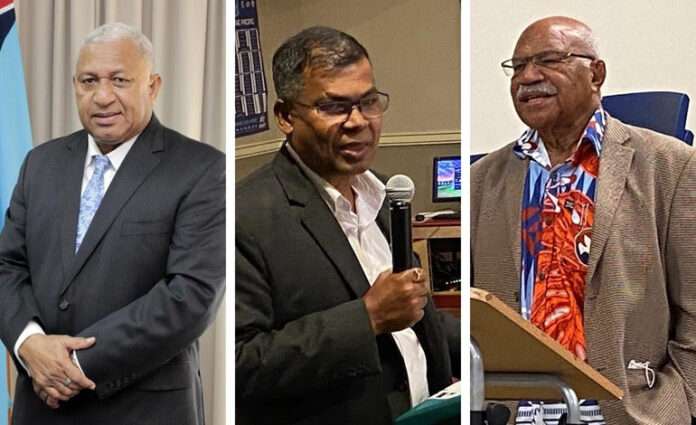While the smaller parties will be seen mostly as vote splitters, the main players remain Prime Minister Voreqe Bainimarama’s Fiji First Party, former Prime Minister Sitiveni Rabuka’s People’s Alliance Party and Professor Biman Prasad’s National Federation Party (NFP)
PRAVASISAMWAD.COM
Fiji is all set to witness the country’s most fiercely contested elections next month on December 14. The election will be contested by nine political parties vying to form a government in the Pacific island nation struggling to shake off its coup culture badge.
While the smaller parties will be seen mostly as vote splitters, the main players remain Prime Minister Voreqe Bainimarama’s Fiji First Party, former Prime Minister Sitiveni Rabuka’s People’s Alliance Party and Professor Biman Prasad’s National Federation Party (NFP).
Bainimarama, a former head of the Fiji Military Forces and the Fiji Navy, is again facing stiff challenge from arch-rival Rabuka, also a former head of the Fijian Army.
The 2018 election was close – with Bainimarama’s party managing to scrape through with 27 seats in the 51-seat parliament, while the Rabuka-led Social Democratic Liberal Party (SODELPA) managed 21, and the NFP three seats.
The change this time around is that there are now 55 seats in parliament, and Rabuka is leading People’s Alliance Party, which is a “revamped SODELPA”, with the original now in tatters following the defection of key players to PAP. The difference is that they have now teamed up with former university academic Prasad’s NFP to form a coalition government should they need each other’s support in a bid to oust Fiji First, which has served two terms in power.
Rabuka, now 74, pioneer of Fiji’s coup culture with his first military takeover of a democratically elected government in 1987, will need more iTaukei (indigenous Fijian) voter support if he wants to win power.
Judging by the turnout at his New Zealand tour community talanoa sessions earlier this year, Rabuka has considerable iTaukei support, but some support from the country’s Indian community would be handy.
On December 14, the country’s close to 700,000 registered voters will be hoping for a smooth transition to power as the scars of four military coups continue to linger
A majority of Fiji’s Indian community, whose forefathers were brought to the country to work in the country’s sugarcane plantations by the British rulers, still distrusts and harbours disdain for the actions of the man who caused them much pain and anguish. That is where the coalition deal with NFP (Fiji’s oldest political party) comes in with Rabuka asking for Indian voters to forgive him for his actions of 1987 and get behind the professor. “I want people to remember me as the Sitiveni Ligamamada Rabuka you know, not as the Sitiveni Ligamamada Rabuka you knew,” Rabuka declared at a talanoa session with Auckland public. That was in reference to several media apologies made by Rabuka over the past few years.
Rabuka was a lieutenant-colonel in the Fiji Military Forces when he overthrew the democratically elected government of Dr Timoci Bavadra in May 1987, and later executed another takeover of the government in September that same year.
Bainimarama is also a coup maker, having taken over the government of Laisenia Qarase in 2006 and going on to serve as caretaker prime minister for eight years before holding an election in 2014. He has already served two terms as Prime Minister and has done much in terms of developing infrastructure and consolidating and promoting multiracialism, but issues like total press freedom have been questioned.
It is almost certain that the majority of Indian community votes will go towards Bainimarama’s Fiji First.
On December 14, the country’s close to 700,000 registered voters will be hoping for a smooth transition to power as the scars of four military coups continue to linger.
*********************************************************************
Readers
These are extraordinary times. All of us have to rely on high-impact, trustworthy journalism. And this is especially true of the Indian Diaspora. Members of the Indian community overseas cannot be fed with inaccurate news.
Pravasi Samwad is a venture that has no shareholders. It is the result of an impassioned initiative of a handful of Indian journalists spread around the world. We have taken the small step forward with the pledge to provide news with accuracy, free from political and commercial influence. Our aim is to keep you, our readers, informed about developments at ‘home’ and across the world that affect you.
Please help us to keep our journalism independent and free.
In these difficult times, to run a news website requires finances. While every contribution, big or small, will makes a difference, we request our readers to put us in touch with advertisers worldwide. It will be a great help.
For more information: pravasisamwad00@gmail.com



